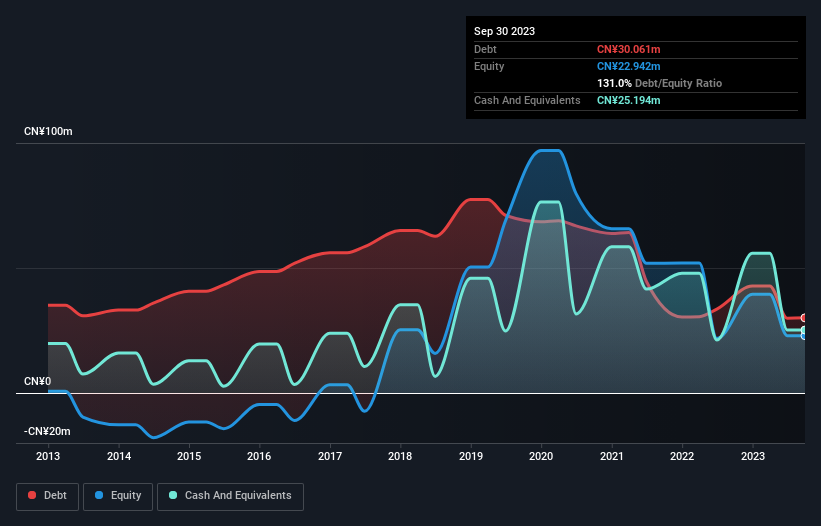Sing Lee Software (Group) (HKG:8076) Is Carrying A Fair Bit Of Debt
Howard Marks put it nicely when he said that, rather than worrying about share price volatility, 'The possibility of permanent loss is the risk I worry about... and every practical investor I know worries about.' When we think about how risky a company is, we always like to look at its use of debt, since debt overload can lead to ruin. As with many other companies Sing Lee Software (Group) Limited (HKG:8076) makes use of debt. But the more important question is: how much risk is that debt creating?
When Is Debt A Problem?
Debt assists a business until the business has trouble paying it off, either with new capital or with free cash flow. If things get really bad, the lenders can take control of the business. However, a more usual (but still expensive) situation is where a company must dilute shareholders at a cheap share price simply to get debt under control. Of course, debt can be an important tool in businesses, particularly capital heavy businesses. The first step when considering a company's debt levels is to consider its cash and debt together.
See our latest analysis for Sing Lee Software (Group)
How Much Debt Does Sing Lee Software (Group) Carry?
As you can see below, Sing Lee Software (Group) had CN¥30.1m of debt at June 2023, down from CN¥42.8m a year prior. However, it also had CN¥25.2m in cash, and so its net debt is CN¥4.87m.

How Healthy Is Sing Lee Software (Group)'s Balance Sheet?
We can see from the most recent balance sheet that Sing Lee Software (Group) had liabilities of CN¥12.0m falling due within a year, and liabilities of CN¥26.5m due beyond that. On the other hand, it had cash of CN¥25.2m and CN¥14.8m worth of receivables due within a year. So it can boast CN¥1.56m more liquid assets than total liabilities.
This short term liquidity is a sign that Sing Lee Software (Group) could probably pay off its debt with ease, as its balance sheet is far from stretched. There's no doubt that we learn most about debt from the balance sheet. But it is Sing Lee Software (Group)'s earnings that will influence how the balance sheet holds up in the future. So if you're keen to discover more about its earnings, it might be worth checking out this graph of its long term earnings trend.
Over 12 months, Sing Lee Software (Group) made a loss at the EBIT level, and saw its revenue drop to CN¥81m, which is a fall of 4.3%. That's not what we would hope to see.
Caveat Emptor
Over the last twelve months Sing Lee Software (Group) produced an earnings before interest and tax (EBIT) loss. Indeed, it lost a very considerable CN¥3.5m at the EBIT level. On a more positive note, the company does have liquid assets, so it has a bit of time to improve its operations before the debt becomes an acute problem. But we'd be more likely to spend time trying to understand the stock if the company made a profit. This one is a bit too risky for our liking. When analysing debt levels, the balance sheet is the obvious place to start. However, not all investment risk resides within the balance sheet - far from it. We've identified 2 warning signs with Sing Lee Software (Group) , and understanding them should be part of your investment process.
If, after all that, you're more interested in a fast growing company with a rock-solid balance sheet, then check out our list of net cash growth stocks without delay.
New: Manage All Your Stock Portfolios in One Place
We've created the ultimate portfolio companion for stock investors, and it's free.
• Connect an unlimited number of Portfolios and see your total in one currency
• Be alerted to new Warning Signs or Risks via email or mobile
• Track the Fair Value of your stocks
Have feedback on this article? Concerned about the content? Get in touch with us directly. Alternatively, email editorial-team (at) simplywallst.com.
This article by Simply Wall St is general in nature. We provide commentary based on historical data and analyst forecasts only using an unbiased methodology and our articles are not intended to be financial advice. It does not constitute a recommendation to buy or sell any stock, and does not take account of your objectives, or your financial situation. We aim to bring you long-term focused analysis driven by fundamental data. Note that our analysis may not factor in the latest price-sensitive company announcements or qualitative material. Simply Wall St has no position in any stocks mentioned.
About SEHK:8076
Sing Lee Software (Group)
An investment holding company, together with its subsidiaries, engages in development and sale of information and network technologies and services to the financial industry in the People’s Republic of China.
Adequate balance sheet and slightly overvalued.
Market Insights
Weekly Picks

Solutions by stc: 34% Upside in Saudi's Digital Transformation Leader


The AI Infrastructure Giant Grows Into Its Valuation
Recently Updated Narratives

Perdana Petroleum Berhad is a Zombie Business with a 27.34% Profit Margin and inflation adjusted revenue Business
Many trends acting at the same time


Engineered for Stability. Positioned for Growth.
Popular Narratives


MicroVision will explode future revenue by 380.37% with a vision towards success


NVDA: Expanding AI Demand Will Drive Major Data Center Investments Through 2026



